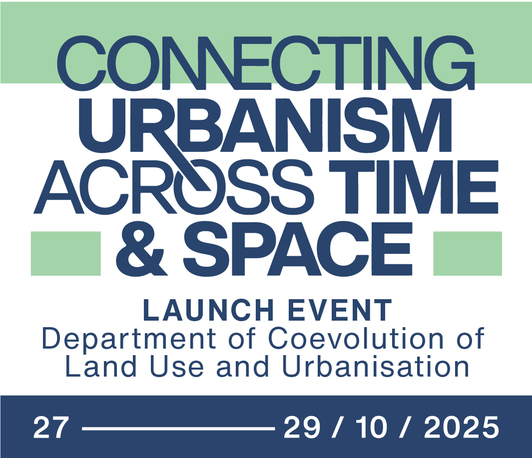CONNECTING URBANISM ACROSS TIME AND SPACE
Launch Event Department of Coevolution of Land Use and Urbanisation
- Start: Oct 27, 2025 09:00 AM (Local Time Germany)
- End: Oct 29, 2025 08:00 PM
- Speaker: Various
- Location: MPI GEA + Normannenhaus Jena
- Room: Library, MPI-GEA
- Host: Department Coevolution of Land Use and Urbanization
- Contact: carleton@gea.mpg.de

Urbanism is an increasingly dominant way of life in the 21st century, with over two-thirds of the human population expected to live in cities by 2050. As it expands, it is increasing the scale and rate of interaction between human societies and Earth systems---contributing to climate change, altering biodiversity, and transforming land use through construction, governance, and consumption. Yet, cities are not recent phenomena. They have a rich, global history extending back at least 5,500 years. This history offers a diverse dataset through which to study the degree to which there are commonalities and distinctions in urban processes, supply chains, policies, land uses, environmental impacts, and adaptations across space and time and offers a source of diversity through which to explore urban alternatives and potential futures.
The temporal, geographic, cultural, and even evolutionary breadth of urban and urban-like phenomena together justify a radically interdisciplinary, consilient approach to urban research. The new Department of Coevolution of Land Use at MPI-GEA is set up to integrate experts in archaeologiy, history, palaeoecology, computational data analysis, and urban science to explore the diversity and similarity of long-term urban patterns and processes, urban responses to climate change, climate extremes, and crises, and urban impacts on land use and environments. Building on the rich record of urban archaeology and history, the conference brings together a globally diverse group of scholars, to seed transdisciplinary collaborations and help orient research moving forward.
Covering a diverse array of methods, regions, and time-periods, the conference seeks to connect systematic, quantitative observations from the deep past to present planning and future predictions. Researchers, as well as policy makers and stakeholders, from a variety of different disciplinary and regional backgrounds will be brought together in question-oriented sessions to present the current data available on:
- How diverse are urban phenomena?
- How has the process of urbanisation operated over multiple timescales in terms of individual cities and the global urban landscape?
- How have cities adapted to crises (climate change, warfare, socioeconomic changes, and political strife)?
- How often have cities moved, changed in size, or disappeared in the past? What were the outcomes for regional populations?
- How have urban supply chains and networks changed and what have been their various vulnerabilities?
- What different types of urban land use and environmental impacts have been observed in different socioeconomic and environmental contexts?
The conference will run from the 27th to the 29th of October and be hosted by the Max Planck of Geoanthropology in the city of Jena, Germany. You are warmly invited to attend. For more information contact carleton@gea.mpg.de